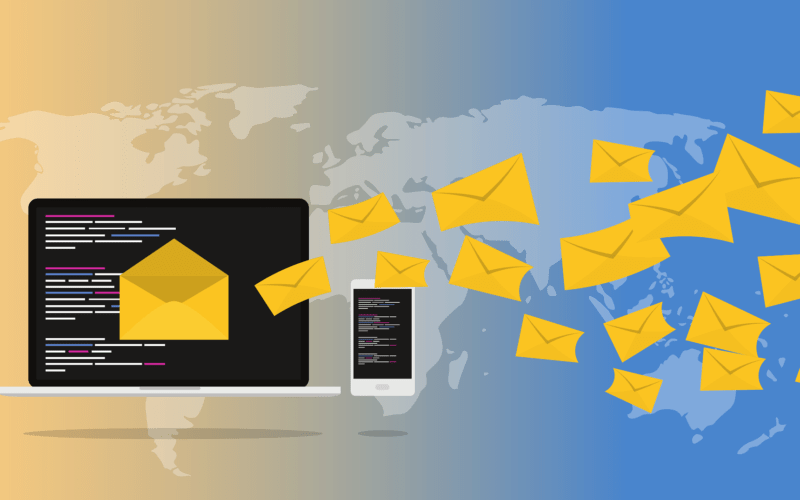In 2025, the global job market is undergoing a significant transformation. According to the World Economic Forum’s latest report, 86% of employers expect AI and information processing technologies to transform their business by 2030. This shift is creating a pressing need for new skills and roles. While AI and data processing are expected to create 11 million new jobs, they are also forecast to displace 9 million, highlighting a fundamental imbalance. This dynamic underscores the challenge for businesses to not only fill current vacancies but also build future-ready teams that can adapt to a rapidly evolving technological landscape.
The Shifting Definition of “Tech Talent”
The traditional view of tech talent, once centered on developers and system administrators, has expanded significantly. The AI era has brought about a need for new and diverse roles, including AI product owners, AIOps specialists, prompt engineers, and AI ethics officers who guide the responsible adoption of the technology. This shift also emphasizes the importance of cross-disciplinary expertise, where professionals can bridge AI with domain knowledge in fields like healthcare, finance, and manufacturing. The ability to craft effective prompts, once a niche skill, is now considered a core competency that influences design and innovation. As a result, tech talent is no longer just about technical expertise; it also requires adaptability, creativity, and ethical responsibility.
Challenges in Recruiting Tech Talent Today
The demand for AI-ready professionals comes with unique and pressing obstacles. The rise of remote work has removed geographical borders, leading to global competition for a limited pool of AI talent. This fierce competition, coupled with high demand, has also led to salary inflation, posing challenges for startups and small and medium-sized enterprises (SMEs). Candidates are increasingly evaluating employers based on their ethical use of AI and transparency, making a company’s commitment to frameworks like the OECD AI Principles or the NIST AI Risk Management Framework a key differentiator. Furthermore, the constant pressure to stay ahead of rapidly evolving tech stacks can lead to burnout risk and talent fatigue, making retention as critical as hiring.
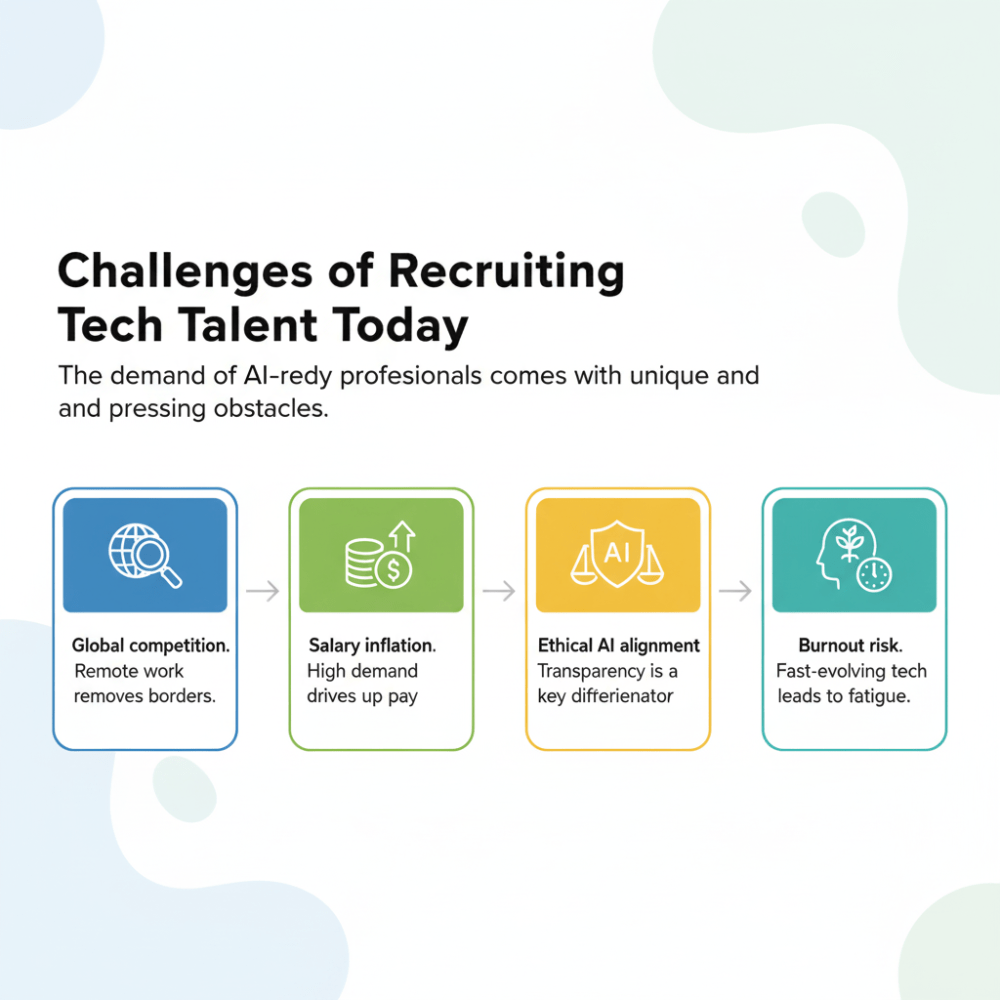
Strengthening Ethical AI Practices
To attract top-tier talent, companies must visibly demonstrate their commitment to ethical AI. This includes establishing an AI Ethics Board or pursuing certifications like the Responsible AI Institute Certification. Publishing AI transparency reports, as exemplified by Microsoft’s Responsible AI Standard, can also significantly influence a company’s appeal to candidates. It’s also crucial for hiring managers to be trained to communicate adherence to these ethical frameworks, signaling credibility and integrity.
How AI Is Transforming Recruitment Itself
AI isn’t just creating new jobs; it’s also revolutionizing the way companies find and engage with candidates. AI-powered sourcing and analytics tools, such as Eightfold.ai or Beamery, can match candidates to open roles based on skills and experience, moving beyond the limitations of keyword-driven resumes. This technology also enhances the candidate experience through chatbots and virtual assistants that provide instant answers and streamline application processes. Additionally, AI can facilitate internal mobility by identifying current employees who can be reskilled into high-demand roles, thereby reducing external hiring needs. By analyzing job descriptions and sourcing processes, AI can also help mitigate bias and improve diversity and inclusion, although continuous vigilance is needed to prevent algorithmic discrimination.
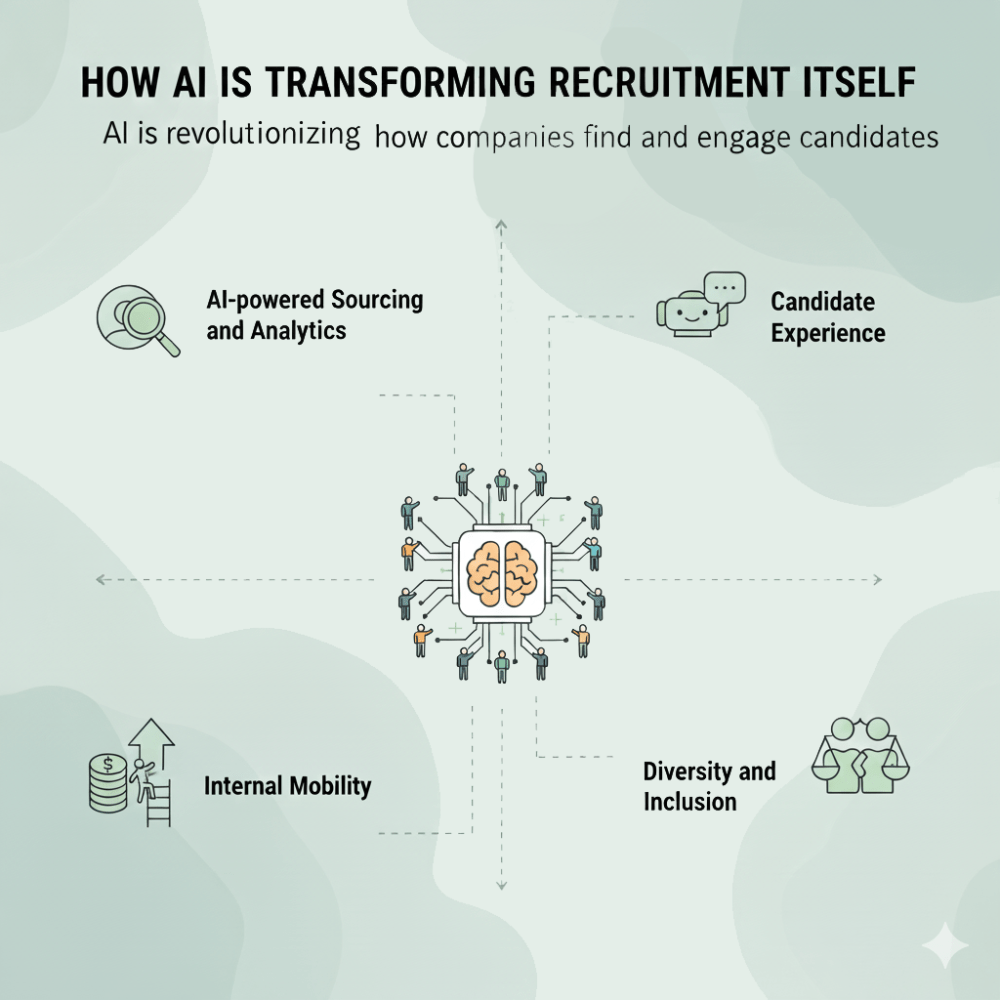
Strategies for Finding and Attracting Tech Talent
To compete for scarce talent, organizations must go beyond traditional hiring practices. Building a strong employer value proposition (EVP) is key. This involves showcasing not only competitive compensation but also flexibility, remote options, and the opportunity to work on meaningful projects with real-world impact. Another effective strategy is to gamify recruitment through AI-driven coding challenges, hackathons, or simulations that reveal a candidate’s real-world skills in an engaging way. Forming partnerships with universities, incubators, and research labs can create pipelines of emerging talent. Leveraging alumni networks and promoting continuous learning through platforms like Coursera or AWS Skill Builder are also powerful magnets for ambitious professionals.
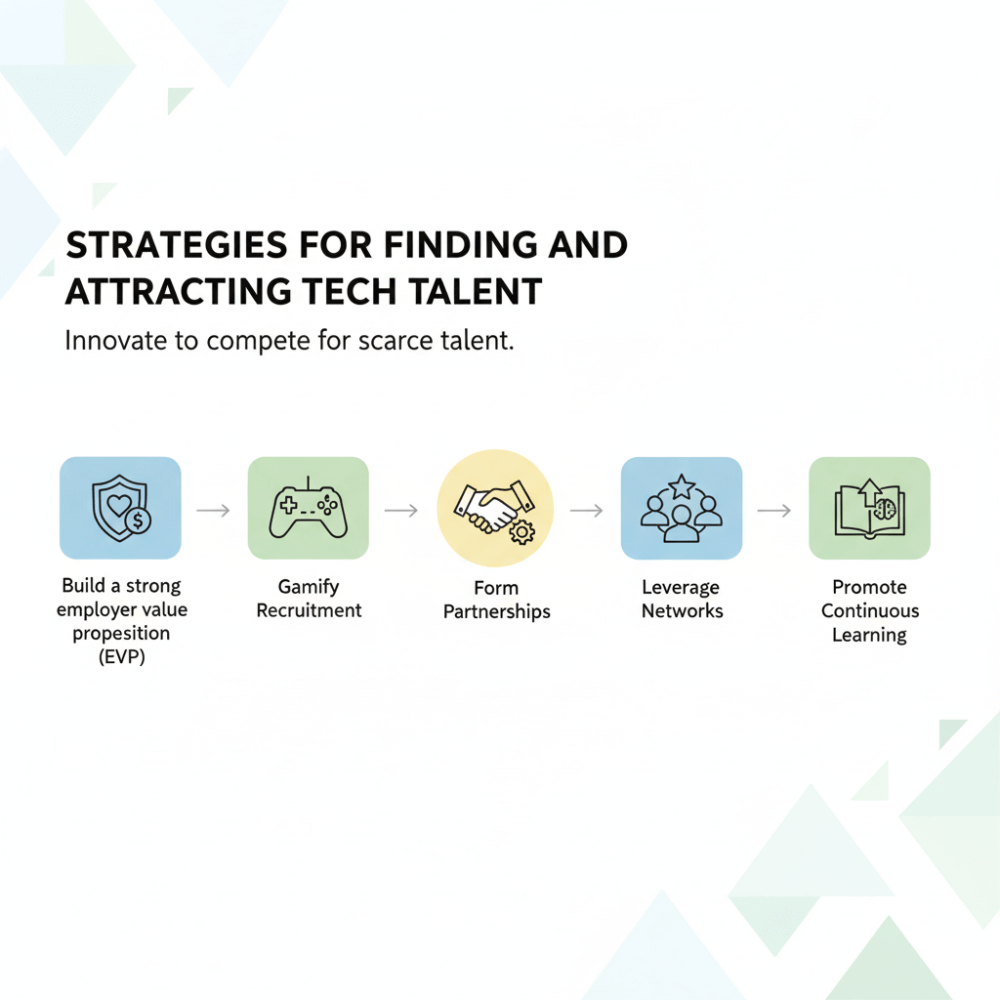
Tips for Job Seekers in the AI Era
Job seekers must adapt to this new landscape. It’s vital to optimize resumes for AI screening by using specific keywords like “machine learning” or “prompt engineering.” Candidates should also showcase real projects by contributing to open-source hubs like GitHub or Kaggle to demonstrate practical skills. Earning micro-credentials from platforms like Coursera or edX can validate expertise, and highlighting familiarity with AI governance frameworks signals a readiness for emerging, ethically-focused roles.
Job-Seeking Platforms in the AI Era
The search for tech talent has expanded beyond traditional job boards to include specialized platforms and marketplaces. AI-driven job platforms like Hired, Wellfound, and Turing match candidates with roles based on skills, career goals, and cultural fit. Freelance and project marketplaces such as Upwork and Fiverr Pro give companies flexible access to specialized talent for short-term needs. Additionally, specialized AI talent hubs like Toptal connect companies with vetted machine learning engineers and data scientists. Community-driven ecosystems on platforms like GitHub, Kaggle, and even Discord, Slack communities have also become important recruitment pipelines where employers can observe real-world problem-solving and collaboration.
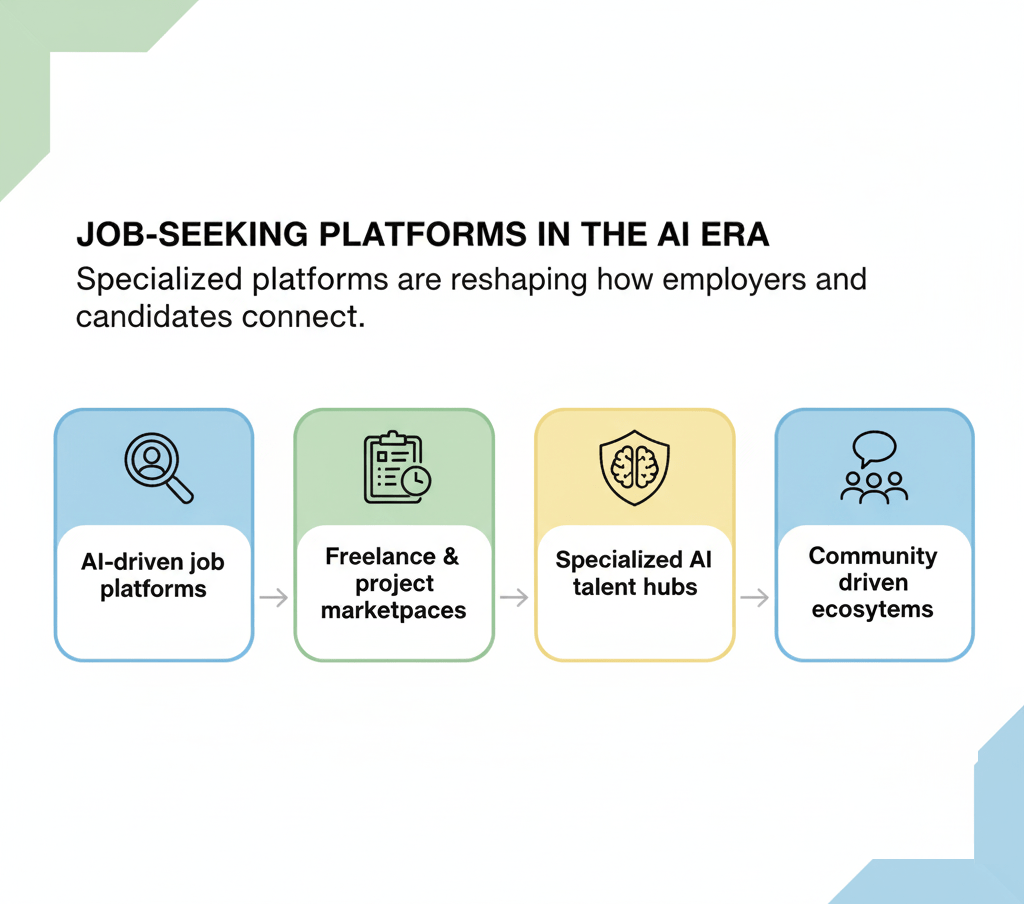
HR and Recruitment Services for Tech Talent
Many organizations also turn to specialized HR and recruitment agencies to bridge the talent gap, leveraging their strategic insights into hiring trends and compensation benchmarks. Tech-focused recruitment firms such as Robert Half Technology and Kforce specialize in placing software engineers and data scientists. For senior-level positions like CTOs, executive search firms provide tailored outreach and vetting. Some agencies also offer managed talent services, building and maintaining talent pipelines and supporting training initiatives. These agencies often have a global reach, which is invaluable for companies struggling to source talent locally. While these services come with a higher cost, the investment often accelerates hiring and reduces risk, especially for high-demand AI roles.
The Future of Tech Hiring
Looking ahead, several key trends will shape how businesses source and retain talent. AI-driven personalization will tailor recruitment marketing and career development paths to individual preferences. Skills will increasingly outweigh degrees, with micro-credentials and project portfolios becoming more valuable than traditional academic backgrounds. Global talent marketplaces for freelancers will continue to expand, giving companies on-demand access to niche skills. Finally, new regulatory frameworks, such as the EU AI Act, will influence role requirements and compliance hiring.
| Option | Best For | Key Benefits | Trade-Offs |
| Job-Seeking Platforms (Hired, Turing, etc.) | Startups, SMEs, project-based hires | AI-driven matching, global talent access, cost-effective | Time-intensive screening, less strategic support |
| HR & Recruitment Agencies (Robert Half, etc.) | Enterprises, leadership roles, scaling teams | Pre-vetted candidates, market insights, faster hires | Higher costs, less sourcing control |
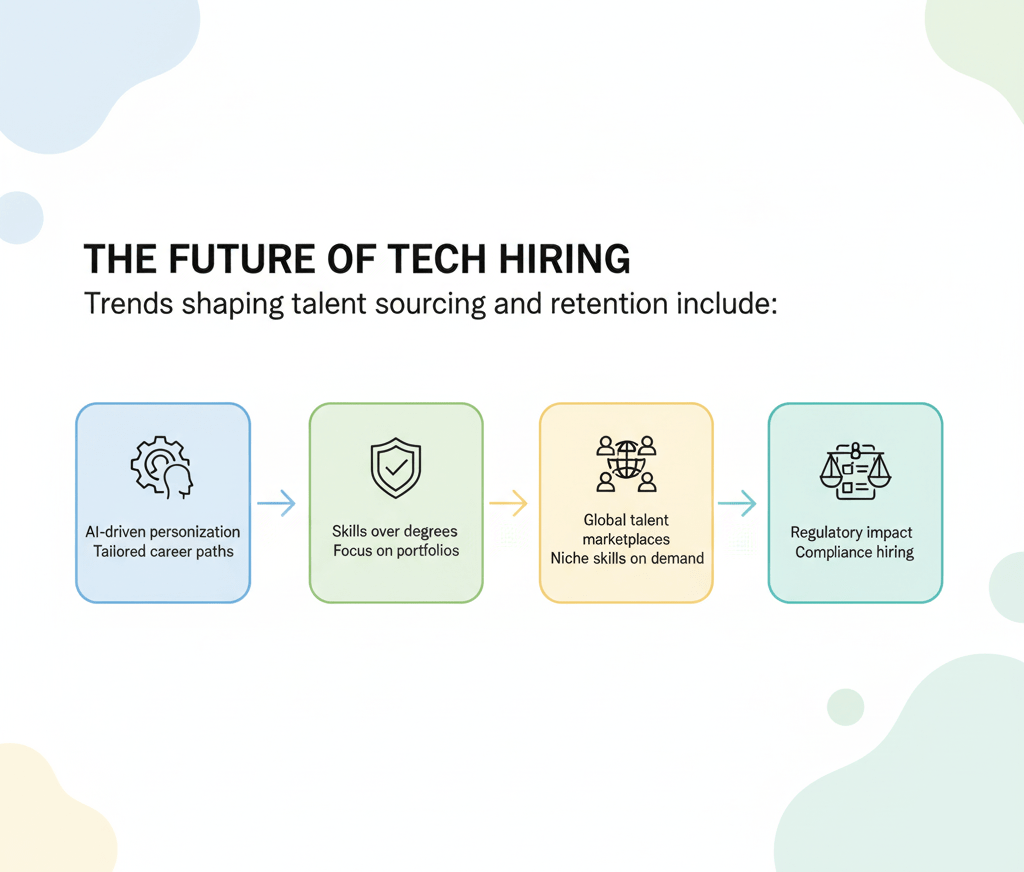
Many companies are adopting a hybrid strategy, using platforms for flexibility and agencies for high-stakes roles.
Conclusion
Finding tech talent in the AI era is about building adaptable teams that can evolve with technology’s rapid changes. To succeed, companies must blend AI-driven tools with a human-centered culture, using a hybrid approach of platforms and agencies while fostering continuous learning. The first step for organizations is to audit their hiring processes for AI readiness and ethical alignment. The winners in this new era will not only secure top talent but also cultivate an environment where innovation, integrity, and adaptability thrive.







